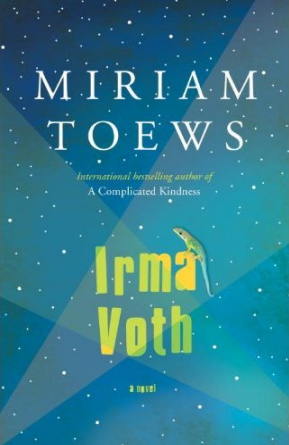By Sasha Moedt (The Cascade) – Email
Date Posted: October 19, 2011
Print Edition: October 12, 2011
 In Irma Voth, Miriam Toews returns to her compelling (and successful) topic of following the inner world of a young teenage girl in a Mennonite community. A Complicated Kindness, which Irma Voth echoes, won Toews the Governor General’s Literary Award for fiction.
In Irma Voth, Miriam Toews returns to her compelling (and successful) topic of following the inner world of a young teenage girl in a Mennonite community. A Complicated Kindness, which Irma Voth echoes, won Toews the Governor General’s Literary Award for fiction.
Toews delves into the mind of a girl subdued by a father, a community and a husband. Irma lives in a small enclosed Mennonite village in Northern Mexico. At 19 she marries a Mexican boy, in a cowed sort-of rebellion against her father, but Irma only finds herself living in a house on her father’s property, with her husband distant and often absent.
Irma is a character worth pursuing in a novel. Her disposition is quiet and insecure, and at the same time peculiarly humorous. The readers can understand her: she doesn’t comprehend more than she’s able to, and that makes her realistic; authors all too often make the mistake of becoming too confident in the thoughts of a character, and it can become unbelievable as to what a character can understand. Toews leaves Irma passive and stumbling on the outside, with her thought process being no contradiction.
Irma is neither clever nor perceptive in these thoughts; her dialogue mirrors this. Often she has nothing to say, and she stares silently at the speaker, embarrassed. When she does speak, she can be confused: “Irma,” she thinks crossly to herself during one conversation, “try to make sense when you speak.”
At one point Irma stands in front of a room of hipsters, and sees clearly what we would see: a long dress, bobby pins sticking into her head from her doak, smelling vaguely of cows. We’ve all been there, not necessarily with cow crap on the boots, but sometimes it feels like it. By giving the audience a glimpse of Irma’s own awareness of herself, Toews works around the possible alienation of her audience to the appearance of a stereotypical strict Menno girl.
The hipsters are a vital part of the story, filmmakers who crash into the quiet village to shoot a movie on the Mennonite people. They include Irma in their escapades, pulling her further from the townspeople. But lonely without her husband, who becomes caught up in the secretive drug business, and rejected by the strict villagers, Irma befriends them. The filmmakers seem to be a direct contrast to Irma’s father, and only serve to confuse her further with odd philosophies on life and art. But she is given a taste of something beyond, something freeing.
As Irma tries to straighten herself out, she is forced to deal with her wild sister, young and curious, threatening to follow Irma in an isolated life. Something must change: Irma cannot force her sister to submit to her father, nor allow her to live in desolation as she herself lives. This problem forces Irma to confront her own situation, her narrow world, and to figure out where she might find freedom.
For the plot readers disappointed with the here-and-there plotline and meandering pace of A Complicated Kindness, take another crack at it with this novel. The plot remains slow, but quite startling at points, and profound. Irma Voth is truthful in its characters, with a twist in the plot that drives the story forward into a distinctive and captivating novel.


